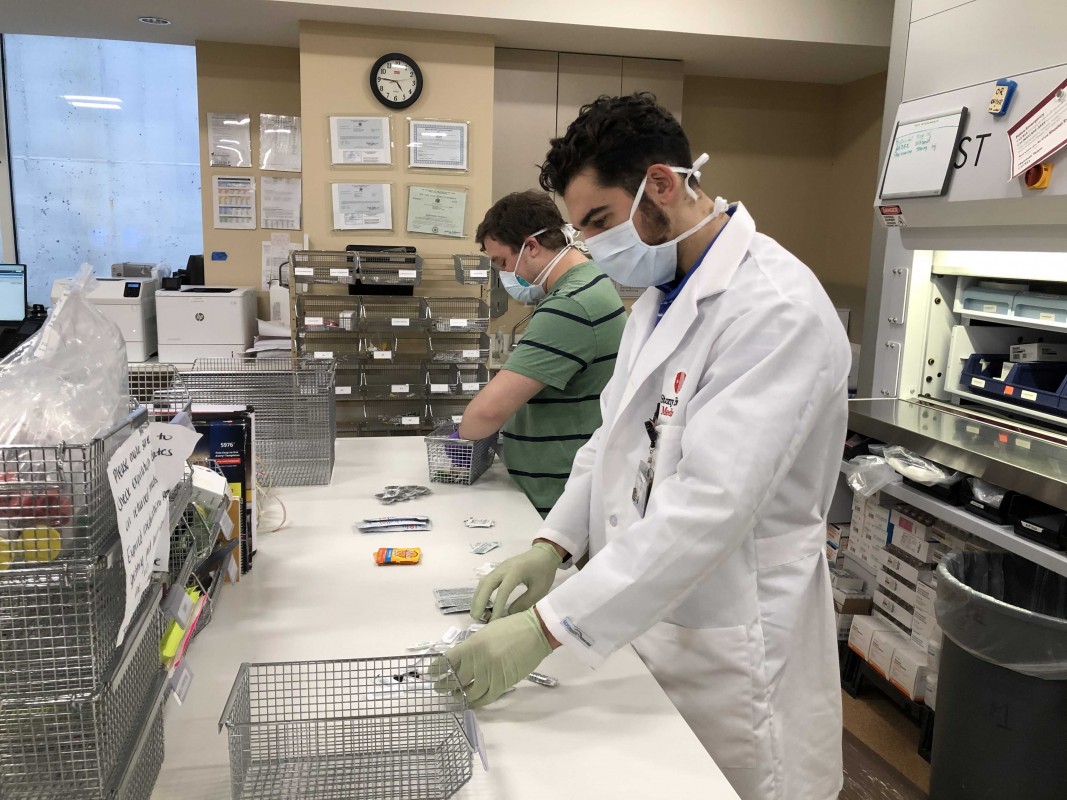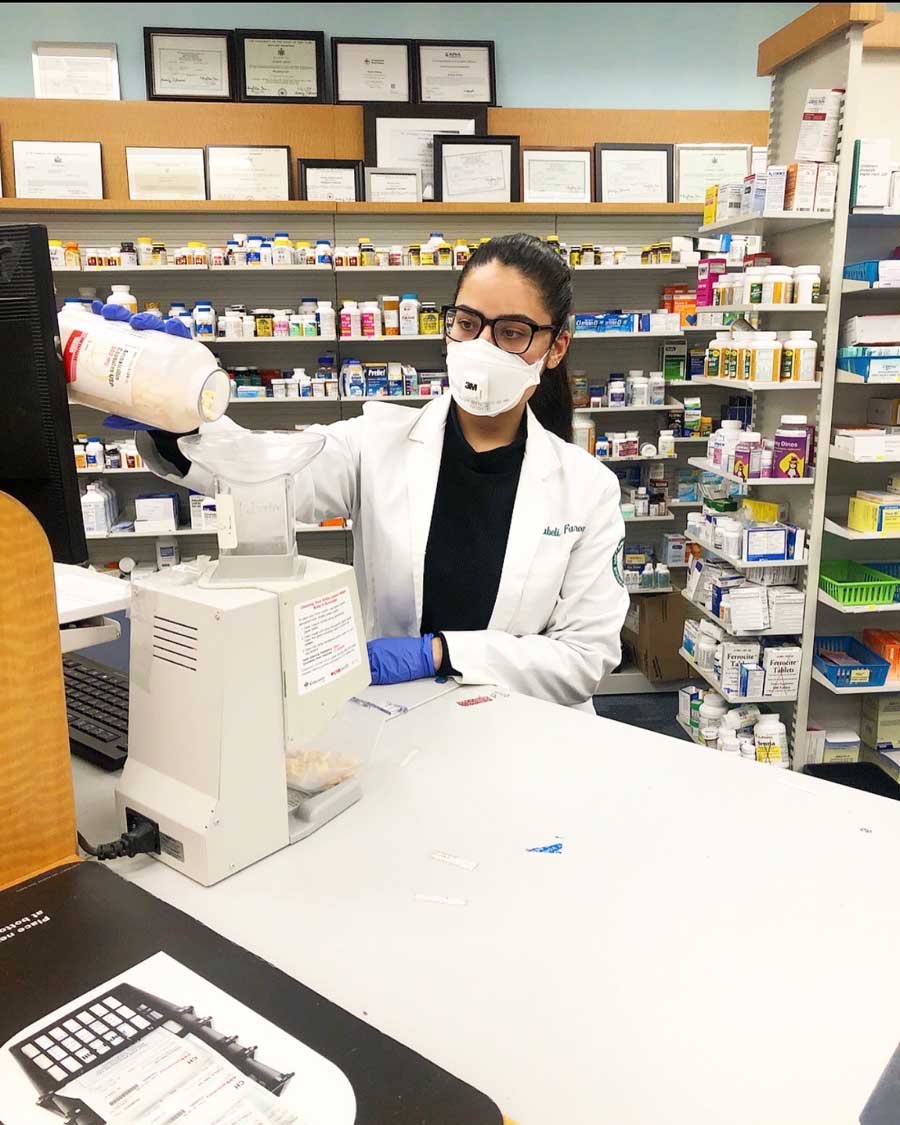Heroes in training: Pharmacy students focus on the job during a pandemic

At CVS and Walgreens, tape demarcates the 6-foot increments where pharmacy customers are permitted to stand. Technicians, pharmacists and interns spritz the keypad and scrub the counter between interactions. At the Price Chopper where Vivian Lam works, clear plastic sheets separate pharmacists from customers to decrease the likelihood of spreading the coronavirus.
Students from Binghamton University’s School of Pharmacy and Pharmaceutical Sciences are on the frontlines of the current pandemic, providing essential healthcare services to the public while juggling online courses in a challenging major.
“I am grateful that I am still able to work and learn during this pandemic, being in a profession that I love,” said P2 (second-year) student James Summers Jr., who works at a Johnson City CVS. “As the human race, this is a very stressful and difficult time that we are all facing, but we can get through this together!”
As techs and interns, students answer patient questions, field calls from doctors, assist with training, track inventory and, of course, fill prescriptions.
Unlike many of his peers, Joseph D’Antonio, a P1 student, works per diem in Stony Brook University Hospital’s pharmacy, where he distributes patient-specific medications, hand-delivers compounded drugs with a short shelf life and prepares IV batches, among other tasks. He has little in the way of patient interaction, but his work is no less important than that of his colleagues in retail pharmacies.
“There are hundreds of drug orders processed and filled daily, and it can become repetitive; however, it is extremely important to always remember that every single order has a unique human being as its destination,” he reflected.
Inside the pharmacy
Pharmacies have always been busy places, the pandemic has sent the number of prescriptions skyrocketing, students said. Sabrina Marquez, a P1 student who works at a Binghamton Walgreens, typically filled 50 to 75 prescriptions per shift prior to the coronavirus outbreak; lately, those numbers have climbed to more than 150, she said. There has been a particular uptick in refill requests for asthma inhalers, and some pharmacies are running low.
Customers are encouraged to use the drive-through, particularly if they are sick or vulnerable. One elderly customer, afraid to come inside, asked Marquez to grab any toilet paper or tissues she could find.
“I was more than willing to go out of my way to do this for her, or any customer, because I understood her fear,” she recounted. “My job is more than filling prescriptions on time; it is being able to be of service to the community as much as I can.”
Sadly, she couldn’t locate any of the requested products in the store. Toilet paper, hand sanitizer and disinfectants remain in short supply at stores across the region, pharmacies included.
While her home store is in Queens, P3 student Shabeli Farooq picks up hours at Binghamton-area CVS pharmacies that need additional help. The Queens store was able to procure the sought-after N95 masks for employees due to the high number of COVID-19 cases, she said. Employees only receive one mask to use for an entire week due to their scarcity, and they must be signed out.
Locally, gloves and masks are available for pharmacy employees, although Summers prefers instead to wash his hands and sanitize between every patient. Pharmacy staff also regularly disinfect common areas to keep them safe for patients and employees alike.
Risks and rewards
Patient interaction brings the possibility of real connection and occasionally danger.
Vivian Lam, a P3 student who works at two local Price Chopper pharmacies, refilled an inhaler for a patient showing respiratory symptoms. He then left his used inhaler on the counter — a definite health risk, she pointed out.
While many patients take coronavirus precautions seriously, others do not. Farooq witnessed one visibly ill woman refusing to cover her mouth when coughing and sneezing, with other customers present. When Farooq politely reminded her of the importance of social distancing, the patient became argumentative, insisting that the coronavirus situation was overblown.
A young man — who joined the same line to pick up a prescription for his grandfather — intervened, saying: “This is exactly why the cases of COVID-19 are increasing on a daily basis. If you don’t care for yourself, please care for the other vulnerable populations that you may be affecting.”
To Farooq, the interaction drove home the different perspectives on coronavirus and their real-life implications. Her own mother is at high risk due to medical complications, as well as her roommate, who has an autoimmune disorder.
“We are in the community serving our patients without personal protective equipment because we took an oath to protect patients,” Farooq said.
Positive interactions with patients also leave an impression. Smiles and an attitude of gratitude can go a long way.
Brian Kam, a P2 student who works at a Binghamton-area pharmacy, recalled one customer who thanked him and the rest of the staff for working under trying conditions.
“It doesn’t happen often, but it puts a smile on my face!” he said. “I encourage people to thank their pharmacists and technicians the next time they see them.”
The benefits of a positive connection go both ways. When D’Antonio first began his hospital job, he was greeted by a regular customer from his previous position at a retail pharmacy.
“That patient still remembered me and instantly brightened up, even though they were suffering an ailment worthy of emergency room admission,” he remembered. “I am a firm believer that in a sea of strangers, just being a familiar face can bring comfort to those in need.”
Filling a critical healthcare role can bring real risks and deep stress, but it’s also rewarding to give back in a time of crisis, students said. When asked to reflect on what such a role entails, Summers ticked off a list of qualities: effective communication, leadership, professionalism, skill, education. Accountability, offered Lam — making sure patients can access medications, regardless of the state of the community around them.
Many pharmacy students offered the same word: hero. It’s why they chose to become pharmacists: the field’s ideals of selflessness and service, and its devotion to aiding others.
“Working during these times makes me truly realize the importance and value of pharmacists and how much impact they can have on a community,” Kam said.



